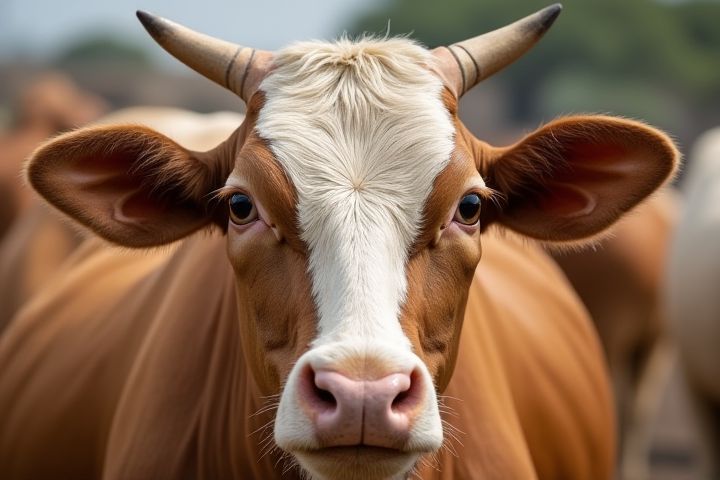
Nigeria boasts a diverse livestock sector, comprising cattle, goats, sheep, poultry, and pigs. The Fulani people primarily raise cattle, with breeds like the White Fulani and Red Bororo being prominent due to their adaptability to local conditions. Sheep farming, particularly of the West African Dwarf breed, is common in the southern regions, while goats such as the Sahel breed are favored for their hardiness. Poultry farming has also grown significantly, contributing to the nation's protein supply and rural economy through the rearing of layers and broilers. Improving veterinary services and herd management practices can enhance productivity and sustainability in Nigeria's livestock industry.
Major Economic Contributor
Livestock farming in Nigeria serves as a pivotal economic contributor, generating significant income and employment opportunities for millions of people across the country. Cattle, goats, sheep, and poultry are the primary livestock species, each playing a vital role in food production, particularly in providing meat, milk, and eggs. The sector also supports the leather industry and contributes to agro-allied businesses by supplying raw materials. Enhancing veterinary services and implementing sustainable practices can further bolster the productivity and profitability of your livestock enterprises in Nigeria.
Diverse Livestock Species
Nigeria's livestock sector encompasses diverse species, including cattle, goats, sheep, and poultry, making it vital for food security and economic growth. Cattle farming, particularly in the northern regions, contributes significantly to beef production and serves as a source of income for many families. Small ruminants like goats and sheep adapt well to various climates, offering meat and milk for local consumption. Poultry farming has gained popularity due to its fast return on investment, providing both meat and eggs, which are essential sources of protein in Nigerian diets.
Pastoralism Practices
Nigeria's livestock sector is predominantly characterized by pastoralism, a traditional practice involving the herding of animals across vast grazing lands. This system primarily supports the rearing of cattle, goats, sheep, and camels, which are vital for the livelihoods of many rural communities. Pastoralism not only contributes significantly to the country's economy through meat and dairy production but also plays a crucial role in cultural identity and social cohesion among various ethnic groups. Sustainable management of these pastoral practices is essential for improving food security and mitigating the impacts of climate change on livestock health and productivity.
Feed and Nutrition Challenges
Livestock in Nigeria face significant feed and nutrition challenges, largely due to seasonal variations and limited access to high-quality forage. The prevalent use of traditional grazing methods often leads to inadequate nutrient intake, affecting animal health and productivity. Furthermore, the rising population pressure exacerbates competition for land, resulting in overgrazing and degradation of pastures. Addressing these issues through sustainable feeding practices and the promotion of balanced diets can enhance livestock performance and overall food security in the region.
Veterinary Services Access
In Nigeria, access to veterinary services is crucial for the health and productivity of livestock, which include cattle, sheep, goats, and poultry. The rise of veterinary clinics and mobile services has improved disease management, vaccination programs, and animal husbandry education for farmers. Understanding zoonotic diseases' impact on both livestock and human populations highlights the importance of effective veterinary care. Ensuring that you have timely access to these services can lead to enhanced livestock welfare and increased agricultural yields.
Disease Outbreak Risks
Livestock in Nigeria faces significant disease outbreak risks, prominently including Newcastle disease, foot-and-mouth disease, and avian influenza. The diverse climate and varying farming practices exacerbate the vulnerability of these animals to infections. Effective biosecurity measures and vaccination programs are essential to mitigate these threats and protect the national livestock industry. Understanding the local epidemiology and maintaining health surveillance can greatly improve disease management strategies in your livestock operations.
Farming System Diversity
Livestock farming in Nigeria showcases a rich tapestry of farming system diversity, characterized by a blend of traditional pastoralism and modern intensive practices. Rearing cattle, goats, sheep, and poultry supports rural livelihoods, significantly contributing to food security and economic stability in various regions. Integrated farming systems, combining livestock with crop production, enhance soil fertility and optimize resource utilization, fostering sustainable agricultural practices. With an estimated population of over 200 million, understanding the nuances of livestock management plays a crucial role in addressing challenges such as climate change and resource scarcity in Nigeria.
Import-Export Market
Nigeria's livestock sector is increasingly integrated into the global import-export market, serving as a vital component of the country's economy. With a diverse range of animals such as cattle, sheep, goats, and poultry, Nigeria aims to bolster its exports to meet international demand, particularly in countries seeking halal meat. The government implements policies to enhance livestock production, improve quality standards, and ensure compliance with global health regulations, which is crucial for accessing lucrative foreign markets. Emphasizing sustainable farming practices can further strengthen Nigeria's position as a competitive exporter of livestock products.
Government Policies
Government policies in Nigeria play a crucial role in the development and management of the livestock sector, which significantly contributes to the nation's economy. Initiatives like the National Livestock Transformation Plan aim to enhance productivity by addressing issues such as grazing land conflicts and livestock diseases. Furthermore, incentives for modern farming practices and access to veterinary services help improve animal health and food security. By aligning livestock strategies with sustainable agricultural practices, the Nigerian government promotes economic growth and rural development, benefiting both farmers and consumers alike.
Environmental Impact
Livestock farming in Nigeria significantly contributes to environmental degradation through deforestation, soil erosion, and greenhouse gas emissions. The increasing demand for meat and dairy products drives overgrazing, which depletes vegetation and leads to land degradation. Proper management practices, such as rotational grazing and integrated crop-livestock systems, can mitigate these impacts and promote sustainable agriculture. Addressing these environmental challenges is crucial for ensuring food security and preserving Nigeria's biodiversity for future generations.
